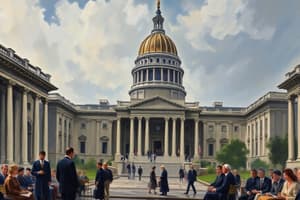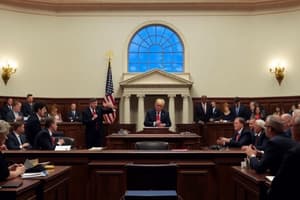Podcast
Questions and Answers
In saying "The power of the speaker of the House is the power of scheduling." Tip O'Neill was referring chiefly to the speaker's power to do which of the following?
In saying "The power of the speaker of the House is the power of scheduling." Tip O'Neill was referring chiefly to the speaker's power to do which of the following?
- control the hours of breaks and meals
- choose the meeting dates of committees
- decide which bills will be debated and when (correct)
- determine the timing of national elections
What does a committee or subcommittee do during markup?
What does a committee or subcommittee do during markup?
- determine the final language of a bill (correct)
- place a bill on the calendar for discussion
- call outside experts to testify
- take an initial informal vote before debate
Which of these groups handles most of the detailed work of lawmaking in Congress?
Which of these groups handles most of the detailed work of lawmaking in Congress?
- Conference committees
- Joint committees
- Select committees (correct)
- Standing committees
A conference committee is made up of members from both the
A conference committee is made up of members from both the
Which of these powers belongs only to the Senate?
Which of these powers belongs only to the Senate?
What do the powers of oversight, confirmation, impeachment, ratification, override, and amendment have in common?
What do the powers of oversight, confirmation, impeachment, ratification, override, and amendment have in common?
Flashcards
Speaker of the House's Power of Scheduling
Speaker of the House's Power of Scheduling
The Speaker of the House controls which bills are debated and when they are debated.
Markup
Markup
During markup, a committee or subcommittee determines the precise wording of a bill.
Standing Committees
Standing Committees
Standing committees handle the most detailed work of lawmaking in Congress.
Conference Committee
Conference Committee
Signup and view all the flashcards
Senate's Power of Ratification
Senate's Power of Ratification
Signup and view all the flashcards
Senate's Confirmation Power
Senate's Confirmation Power
Signup and view all the flashcards
Impeachment
Impeachment
Signup and view all the flashcards
Congress's Check and Balance Powers
Congress's Check and Balance Powers
Signup and view all the flashcards
Study Notes
Speaker of the House's Power
- The speaker's power primarily involves scheduling
- This includes setting meeting times, breaks, and meal times
- Also includes determining which bills will be debated and when
Committee Markup
- Committees and subcommittees review and refine proposed legislation during markup
- This involves experts testifying
- Also includes finalizing the language of a bill
- Bills are placed on the calendar for discussion
Lawmaking in Congress
- Standing committees handle most of the detailed work of lawmaking
- They analyze, amend, and refine bills
Conference Committees
- Conference committees consist of members from both the House and Senate
- These committees reconcile different versions of the same bill between the two houses
Senate-Specific Powers
- The Senate holds the exclusive power to approve treaties
- The Senate also has the sole power to conduct impeachment trials of federal officials
Checks and Balances
- Oversight, confirmation, impeachment, ratification, override, and amendment are powers that help Congress maintain balance with other branches
- These powers allow Congress to check the power of other branches
- These powers do not allow Congress to dominate other branches
Studying That Suits You
Use AI to generate personalized quizzes and flashcards to suit your learning preferences.




